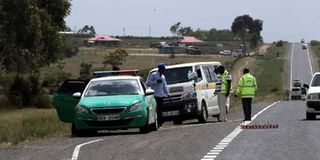Effective public institutions can reduce fraud, waste of resource

NTSA officers inspect a matatu at road block along Nyeri-Nanyuki highway on December 15, 2017. PHOTO | JOSEPH KANYI | NATION MEDIA GROUP
What you need to know:
Death and serious injuries on highways impose a huge cost on the economy.
Both the police and NTSA officers are preoccupied with ambushing speeding motorists by the day and chasing after drunk drivers at night.
Road users are also to blame for breaking traffic regulations with impunity and bribing officials to escape sanctions.
The education system needs a major overhaul to give students hope and prepare them for the future of work and entrepreneurship.
The transport and education sectors need a major shake-up. Poor student performance, frequent road accidents, bribery and fraud are the hallmarks of a systemic crisis progressively getting out of hand and causing wastage of public resources.
Death and serious injuries on highways impose a huge cost on the economy. The blame falls on the National Transport and Safety Authority’s (NTSA) failure to deliver on its mandate to improve road safety.
It’s not clear what the NTSA was supposed to do different from what traffic police were doing. Both the police and NTSA officers are preoccupied with ambushing speeding motorists by the day and chasing after drunk drivers at night.
The end-tale for errant motorists is the same. There are two options on the table: Face the courts or negotiate your way out. The police know how to tune up scared road users, who are always in a hurry. The more they threaten motorists with fire and brimstone, the more they extort.
ROAD SAFETY
The police and NTSA officers don’t really care about road safety and wastage of human life on the roads. Business is good when more motorists are breaking the law.
Road users are also to blame for breaking traffic regulations with impunity and bribing officials to escape sanctions. Most offenders would rather take the easier option than go through the burden of compliance.
The wastage on the roads can only stop if the road safety operations are entrusted to men and women who aren’t motivated by bribery and corruption. The Ethics and Anti-Corruption Commission needs to step up its sting operations to arrest criminal police and NTSA officers, who should be subjected to lifestyle audits. But the EACC has a history of high-profile arrests with most of the cases it has tried to prosecute stuck in the bureaucracy of the courts.
DEVELOPMENT CRISIS
Wastage through the education system has turned into a development crisis. The education authorities, teachers, parents, students and even the society share the blame for the mass failure of the 2017 Kenya Certificate of Secondary Education candidates. Statistically, it is not possible to have only 11 per cent of the candidates (70,000 who scored C+ and above) achieve an average pass while the rest of the 615,773 fail to make the cut.
Such an outcome points to a serious breakdown in the factors that determine student performance. It creates an opportunity for the chosen few to proceed to university while condemning the masses to scramble for the few slots in colleges offering diploma and certificate courses. Those who are unable to secure a place are consigned to rot and waste.
Learning outcomes are the sum total of the intelligence of the students and the influence of their learning environment. The quality of the environment should, ideally, produce students who have basic skills that can be harnessed for Kenya’s socio-economic transformation.
OVERHAUL
The education system needs a major overhaul to give students hope and prepare them for the future of work and entrepreneurship.
The current outcomes fail to provide this much-needed link between education and demand for skills necessary to support productive economic activities.
The government and other education stakeholders need to diagnose the cause of the weaknesses in the system and find solutions to improve the learning outcomes. They need to assure students that going to school is not in vain but lays a foundation for their prosperity.
The future of the economy depends on an efficient transport system that facilitates movement of goods and services and an education system that produces labour with the right skills for development.
When the two sectors — transport and education — break down, the economy will falter and won’t realise the momentum for growth and social transformation.
Mr Warutere is a director of Mashariki Communications Ltd. [email protected]





